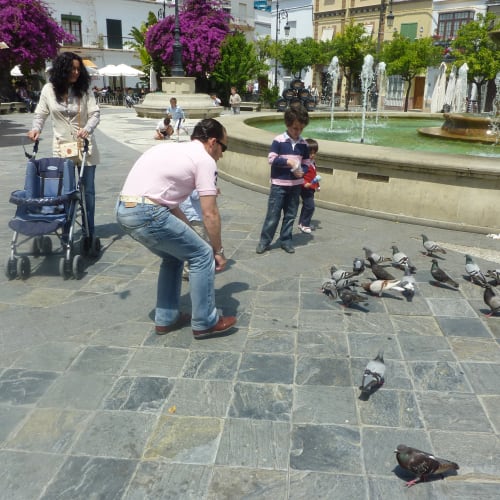Bonding in the 21st Century
March 2010




I have been writing reflections about Spain and her culture over the past several years. The prevailing theme has been that the bedrock of the traditional Spanish culture is the importance they place on being together as a family, including the extraordinary way they cherish their children.
A few years ago, this was the normal way of life throughout Spain: uncles and aunts, cousins and grandparents were next door neighbors. They saw each other several times a week while shopping at the local market or at their favorite tapas bar. Family members often worked together in the fields, operated local shops or manned the fishing boats.
It was a preindustrial society, where the natural cycles of the seasons, from planting to harvest, encouraged a stable way of life. Even though there have been some profound changes in the social structure of Spain in the past 20 or 30 years, the foundational values of integrated family loyalty and mutual support are still in place.

The development of society in America over the past few generations has taken a different turn as waves of immigrants arrived from many different homelands. The new Americans gained a great deal of individual freedom because they were no longer bound by the customs of an older culture. However, it was at the cost of losing a sense of belonging.
As a result, the United States and Canada are young and flexible countries, but with fragile family roots. It is not uncommon in America for parents to live in one state and their children to live hundreds of miles away. I have friends who fly 4,000 miles from Richmond to Anchorage in order to see their grandchildren for a week or two each year!
This family separation was brought home to me while attending our annual La Tienda party. Each year our family enjoys an evening with the La Tienda "family" thanking them for their hard work during the holiday rush. This year was especially memorable because we were together in our new La Tienda retail store, a historic farmhouse and potter’s studio that we have transformed to reflect the "ambiante" of Spain.
As we enjoyed tapas with our employees and their families, I noticed that we were a veritable United Nations! There were people from a dozen different countries: Portugal, Spain, Cuba, Bolivia, Dominican Republic, El Salvador, Greece, India, Brazil, the Philippines, Puerto Rico and, of course, the United States. Not that we had planned it that way, but this is America!
Most of these industrious men and women have come to the United States to make a better life, just as my grandparents chose to do around the turn of the 20th Century. But there is a cost, often overlooked, that is integral to their decision to come to America: they are separated from generations of their families who remain behind.
We were with many proud parents with their happy children scampering from room to room. But most of the families there are not able to replicate the traditional extended family structure that Ruth and I and our children enjoy, and I write about in my Reflections. They live far from parents and brothers and sisters whom they hold dear. Their children do not grow up close to uncles and aunts, cousins and grandparents.
This is a significant loss. They need to find other ways to maintain the family ties and make a healthy life for themselves and their children. But necessity is the mother of invention, especially in America. What I learned in talking with our fellow workers is that some of them have been very ingenious in maintaining close ties with those back home.
One example is Nirav from India. His father felt strongly that his family should eat together around a common table every day. Nirav continues this tradition: he eats a meal with his family in India every week, even though they are on the other side of the world. How does he do that?
Nirav and his parents have a standing appointment once a week. Each Saturday morning Nirav gets up, takes a shower and dresses in a careful manner. Then he sets the table for breakfast in front of his computer. When all the elements are assembled, he "Skypes" his parents in India. Anticipating the call, Nirav's parents have set the table for their evening meal. When they are connected via Skype, Nirav and his parents share conversation and a common meal, or at least a common mealtime via video.

For those of you who are unfamiliar with Skype, it is a wonderful tool, which you can have for free on your computer. Once you download it, you can call other Skype users all over the world at no cost. What if your family member or friend does not have Skype? They can download it in 30 seconds. If they do not have a computer you can use Skype to telephone them at virtually no cost.
Nirav has taken advantage of this remarkable new technology to be with his family on the other side of the world. He told me wryly that he spends more time with his parents now than when he lived in India with the myriad distractions which are part of a young man’s fast-paced life. He has overcome the realities of 21st century life in which traditional bonds may be strained by geography.
Just as Nirav video calls his home in India, our friend Millie calls her family in Bolivia once or twice a week. Here in the United States she is raising a happy family with her husband and two children, yet her ties to her family in Bolivia are not broken. She tells me that she never misses a birthday or a family occasion, and is in close touch. Again, it is through Skype.
What I took away from that party with the Tienda community of workers is this: if you value close family ties and the healthy life they bring, you can maintain them, even in adverse situations. You just have to be committed and ingenious. Of course Nirav and his parents would love to be able to be in the same room, sharing a meal together and enjoying each other's presence. But that is not to be, so Skype makes possible a pretty good substitute.
What of the people back in the Old Country? In Spain during the recent boom years, it was a little harder to maintain the traditional social structure. There were the attractions and demands of the glamorous fast-moving new economy. The severe economic "crisis" has prompted many young Spaniards to reevaluate their new found autonomy and renew their traditional ties to their families.
I send my best to you and to those whom you love.
Don

